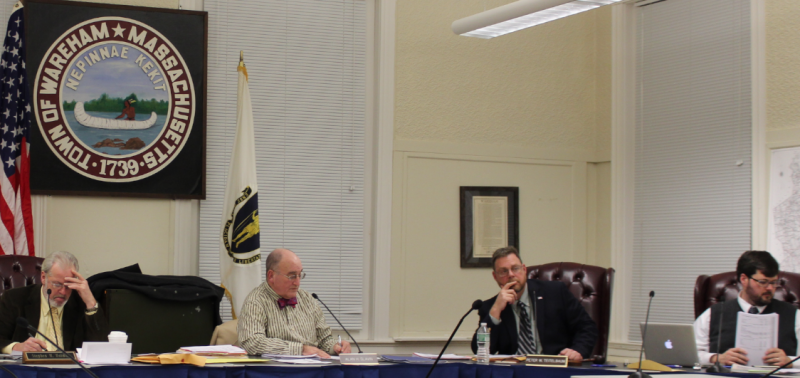Battling the Budget: A revenue problem for 2015 and beyond
With a $2.9 million budget deficit on the horizon, the Wareham Board of Selectmen, School Committee and Finance Committee agree there are two options: continue to make devastating budget cuts or ask the voters to increase funding to the town.
"The question is $2.9 million; what are we going to do?" said Town Administrator Derek Sullivan at Tuesday night's joint meeting of the three boards.
"We are down to beyond bare bones," said Selectman Judy Whiteside. "How much further do we want to drive this town under before we recognize the fact that if you want something, you have to pay for it."
Committee members discussed the two main problems facing the financial future of the town, rising fixed costs such as health care, and the Proposition 2 1/2 law that stifles funding.
Finance Committee Chairman Larry McDonald said from fiscal year 2013 to 2015 expenses have grown by $4 million while revenue has only increased by $1.7 million. He said the majority of the growth in expenses comes from debt, offsets, payments to Upper Cape Technical School and employee benefits such as retirement and medical insurance.
There was a 6.1 percent increase in health care premiums in the budget from 2014 to 2015 alone.
McDonald said over that two-year time period, "If you take the general government and school district and put them together, that represents less than ten percent of the growth in expenses."
"When we talk about cutting the budget, we're cutting out of that ten percent, we're not cutting out of the 90 percent and you can only cut so far down to the ten percent," McDonald said. "If we try to carve $2.9 million out of this budget, we're gonna do it again next year because these items are not going to stop growing."
Selectman Peter Teitelbaum said medical insurance is "the big elephant in the room."
"We've got to keep it from screwing up the rest of the budget, which it does, and try to get some idea on how to contain it and not put it all on the employees. We need to look for a more efficient system," he said.
Selectman Patrick Tropeano said while constantly rising benefit costs are a problem, the biggest problem is with the system itself.
"Proposition 2 1/2 is what is called 'phased in bankruptcy'," he said.
In 1980, the state passed Proposition 2 1/2, which limits an increase in a town's tax levy to 2.5 percent each year.
He explained how the system is not equitable throughout the state, pointing out a town like Weston, "has $8 million houses on every corner" and "a billion dollar real estate levy base and get millions of dollars every year in extra money to run the town and they override Proposition 2 1/2 for schools on a regular basis."
Under Proposition 2-1/2, Wareham could only raise $815,000 more in taxes in 2014 than it did in 2013. The allowed increase from 2014 to 2015 is projected to be $847,000. That is for the same period in which expenses have risen by $4 million.
While local taxes have contributed to slightly more of the town's revenue is recent years, state aid has dropped at the same time. Total expenses for Wareham's proposed 2015 budget are $58.3 million while the total general revenue is $55.4 million.
"We've got an immediate problem. We can't just kick the can down the road another year," said School Committee member Clifford Sylvia. "We've got a revenue problem."
Tropeano said, "We have to use the system to fix it. If it says the way around it is you have to go out and prove to people we need an override, that's what we have to do."
School committee member Geoffrey Swett said a $3 million override for Wareham would convert to roughly $200 per median household, based on conversations he had with the Town Treasurer/Collector John Foster.
Swett suggested developing two budgets for Town Meeting, one contingent on an override and one if the override does not pass.
"We have one option, which is a 2.9 million machete to the throat, or we're going to have another option. What we have to be able to do is not only ask for this money but show this is what were going to do with it for the next five years. If we don't we're destined to fail," McDonald said.















